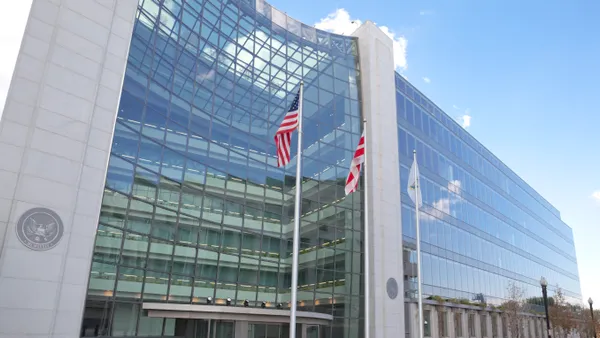Dive Brief:
- A rising number of global companies have set or plan to set their own carbon pricing standards or charge themselves for their carbon emissions in lieu of an international standard, according to Reuters’ analysis of company disclosures by the nonprofit Climate Disclosure Project.
- Of the 5,435 companies that make climate-related disclosures, 20% reported using an internal carbon price in 2022 — up from 17% in 2021 — and 22% plan to use one in the next two years, according to the analysis released Monday. Companies’ internal prices varied widely, ranging from under $1 to $1,600 per metric ton.
- The creation of a global carbon offset trading market was brought up again at COP28, but the annual global climate summit ended Tuesday night with no finalized plans. While global policymakers will have to begin anew on designing a carbon trading system to allow companies and countries to purchase credits from each other, an agreement was reached to begin to transition away from fossil fuels to reach net zero by 2050.
Dive Insight:
Without clear global regulatory guidance, companies have turned inward, with several executives who spoke with Reuters saying internal pricing plans helped them cut emissions and clarified the implications of capital spending and other business activities for the planet.
However, analysts warned Reuters companies who set their carbon price too low may welcome greenwashing accusations, and if a carbon price is set too high, it could drastically change a company’s investment strategy. While the median prices are still too low to heavily influence corporate decisions, trends show companies are preparing for increased regulations, the analysts added.
There were 158 U.S. companies who had internal carbon prices in 2022, according to CDP, a figure that has risen each year since 2019. California pharmaceutical company Amgen has the highest internal cost of carbon among global climate disclosing companies, setting the high end of the threshold at $1,600 per metric ton. However, the median price has only risen modestly since 2019.
The International Monetary Fund recently recommended carbon prices should reach $85 per ton by 2030, an update from a previous recommendation of $75 per ton by the end of the decade. The United Nations’ financial agency said the world needs more ambition and stronger policies to get back in line with the global goal of limiting warming to 2 degrees Celsius — ideally within 1.5 degrees — and proceeds of carbon sales would support vulnerable communities. The IMF estimated 20% of carbon pricing revenues would “more than compensate” the poorest 30% of households.
“Ambition alone is not enough. We also need major policy changes to achieve these more ambitious targets,” IMF wrote in a Nov. 27 blog post.
Various regulators have created guideposts for carbon prices, but they too vary by jurisdiction. The Biden administration calculated the “social cost” of carbon to equal $200 per metric ton, according to a proposed Environmental Protection Agency regulation on greenhouse gas emissions in the oil and gas sector. Across the pond, permits to join the European Union’s carbon market hit a milestone in February, selling for a record $106.57 (100 euros) per ton, and were priced at $86 (79.65 euros) at the end of October, according to Statista.
Heading into COP28’s final day in Dubai, Günther Thallinger, chair of the UN-backed Net-Zero Asset Owner Alliance, urged world leaders to finalize a plan for global carbon pricing to incentivize investments in emission-abatement technologies and reduce consumer demand for products that are emissions-intensive.
“Governmental carbon pricing is a necessary part of the climate policy toolkit required to achieve net-zero emissions and reach the Paris Agreement goals,” Thallinger said. “Carbon pricing provides a broad incentive for decarbonisation, driving emissions reductions where they are most cost-effective.”
Ultimately, a plan for a global carbon trading market was scuttled in the final hours of the conference. A plan the U.S. and others were pushing for would have created a system for verifying and trading carbon credits run by the UN, with looser restrictions than the EU’s market, operating alongside existing voluntary carbon trading markets. A bloc of delegates from the EU, Latin American and African states opposed a plan championed by the majority, calling for stricter standards, Climate Home News reported.
The UN Framework Convention for Climate Change technical working group will now head back to the drawing board to attempt to rework a carbon market proposal for next year’s COP29 in Azerbaijan.












